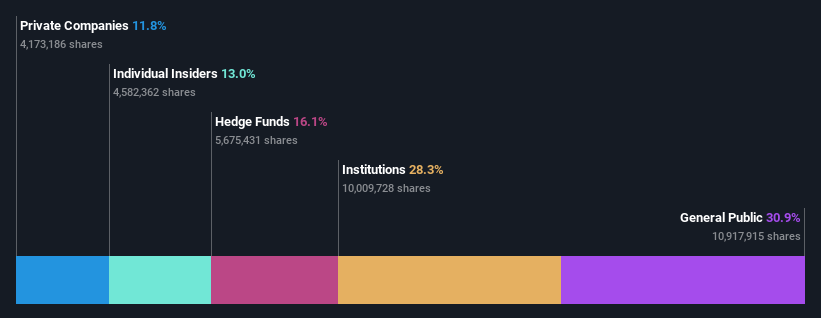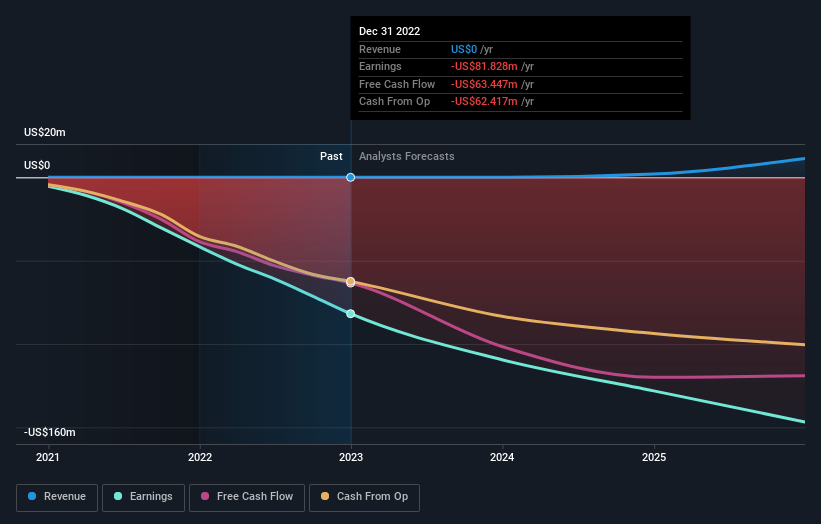individual investors who own 31% along with institutions invested in Biomea Fusion, Inc. (NASDAQ:BMEA) saw increase in their holdings value last week
Key Insights
The considerable ownership by individual investors in Biomea Fusion indicates that they collectively have a greater say in management and business strategy
The top 7 shareholders own 51% of the company
To get a sense of who is truly in control of Biomea Fusion, Inc. (NASDAQ:BMEA), it is important to understand the ownership structure of the business. With 31% stake, individual investors possess the maximum shares in the company. Put another way, the group faces the maximum upside potential (or downside risk).
While individual investors were the group that reaped the most benefits after last week’s 27% price gain, institutions also received a 28% cut.
Let's take a closer look to see what the different types of shareholders can tell us about Biomea Fusion.
Check out our latest analysis for Biomea Fusion
What Does The Institutional Ownership Tell Us About Biomea Fusion?
Institutions typically measure themselves against a benchmark when reporting to their own investors, so they often become more enthusiastic about a stock once it's included in a major index. We would expect most companies to have some institutions on the register, especially if they are growing.
As you can see, institutional investors have a fair amount of stake in Biomea Fusion. This suggests some credibility amongst professional investors. But we can't rely on that fact alone since institutions make bad investments sometimes, just like everyone does. When multiple institutions own a stock, there's always a risk that they are in a 'crowded trade'. When such a trade goes wrong, multiple parties may compete to sell stock fast. This risk is higher in a company without a history of growth. You can see Biomea Fusion's historic earnings and revenue below, but keep in mind there's always more to the story.
It would appear that 16% of Biomea Fusion shares are controlled by hedge funds. That's interesting, because hedge funds can be quite active and activist. Many look for medium term catalysts that will drive the share price higher. Our data shows that A2A Pharmaceuticals, Inc. is the largest shareholder with 12% of shares outstanding. With 10% and 7.8% of the shares outstanding respectively, Cormorant Asset Management, LP and Janus Henderson Group plc are the second and third largest shareholders. Furthermore, CEO Thomas Butler is the owner of 7.1% of the company's shares.
We also observed that the top 7 shareholders account for more than half of the share register, with a few smaller shareholders to balance the interests of the larger ones to a certain extent.
While studying institutional ownership for a company can add value to your research, it is also a good practice to research analyst recommendations to get a deeper understand of a stock's expected performance. There are plenty of analysts covering the stock, so it might be worth seeing what they are forecasting, too.
Insider Ownership Of Biomea Fusion
The definition of an insider can differ slightly between different countries, but members of the board of directors always count. The company management answer to the board and the latter should represent the interests of shareholders. Notably, sometimes top-level managers are on the board themselves.
I generally consider insider ownership to be a good thing. However, on some occasions it makes it more difficult for other shareholders to hold the board accountable for decisions.
Our most recent data indicates that insiders own a reasonable proportion of Biomea Fusion, Inc.. It is very interesting to see that insiders have a meaningful US$139m stake in this US$1.1b business. It is good to see this level of investment. You can check here to see if those insiders have been buying recently.
General Public Ownership
The general public, who are usually individual investors, hold a 31% stake in Biomea Fusion. This size of ownership, while considerable, may not be enough to change company policy if the decision is not in sync with other large shareholders.
Private Company Ownership
Our data indicates that Private Companies hold 12%, of the company's shares. Private companies may be related parties. Sometimes insiders have an interest in a public company through a holding in a private company, rather than in their own capacity as an individual. While it's hard to draw any broad stroke conclusions, it is worth noting as an area for further research.
Next Steps:
I find it very interesting to look at who exactly owns a company. But to truly gain insight, we need to consider other information, too. For example, we've discovered 4 warning signs for Biomea Fusion (2 are significant!) that you should be aware of before investing here.
If you are like me, you may want to think about whether this company will grow or shrink. Luckily, you can check this free report showing analyst forecasts for its future.
NB: Figures in this article are calculated using data from the last twelve months, which refer to the 12-month period ending on the last date of the month the financial statement is dated. This may not be consistent with full year annual report figures.
Have feedback on this article? Concerned about the content? Get in touch with us directly. Alternatively, email editorial-team (at) simplywallst.com.
This article by Simply Wall St is general in nature. We provide commentary based on historical data and analyst forecasts only using an unbiased methodology and our articles are not intended to be financial advice. It does not constitute a recommendation to buy or sell any stock, and does not take account of your objectives, or your financial situation. We aim to bring you long-term focused analysis driven by fundamental data. Note that our analysis may not factor in the latest price-sensitive company announcements or qualitative material. Simply Wall St has no position in any stocks mentioned.
Join A Paid User Research Session
You’ll receive a US$30 Amazon Gift card for 1 hour of your time while helping us build better investing tools for the individual investors like yourself. Sign up here

 Yahoo Finance
Yahoo Finance 

